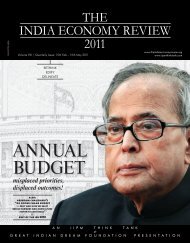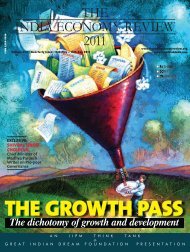Download - The India Economy Review
Download - The India Economy Review
Download - The India Economy Review
You also want an ePaper? Increase the reach of your titles
YUMPU automatically turns print PDFs into web optimized ePapers that Google loves.
T RANSFORMATIVE PLANNING<br />
Decommissioning the<br />
Planning Commission<br />
Basic Structure theory and directive principles of state policy to a Public-Private-<br />
Partnership (PPP) model through the Public Accountability Information System<br />
(PAIS) or Right To Information (RTI) route<br />
Rabin Majumder<br />
Advocate & Attorney,<br />
Nu.Delhi.Law.Fora,<br />
New Delhi<br />
British Raj sponsored program<br />
called Planning Commission<br />
ever since its inception<br />
in 1930s has been fairly<br />
doing well until 1991. However, under<br />
compulsion of BoP crisis, subsequently,<br />
<strong>India</strong> had to adopt economic reforms in<br />
1991 which, in effect, embarked upon a<br />
program of short term stabilization combined<br />
with a longer term program of<br />
comprehensive structural reforms responding<br />
to the need for a system<br />
change, involving liberalization of government<br />
controls, a larger role for the<br />
private sectors and greater integration<br />
and synchronization with the world<br />
economy. And the obvious natural corollary<br />
is that, as some experts put it, Planning<br />
Commission changed its naming<br />
characteristic into “Reforms Commission”.<br />
In the recent past ever since reforms,<br />
<strong>India</strong>n polity and policy have<br />
witnessed a major shift from long patronized<br />
mixed economy to open-market<br />
survival kit thereby changing Planning<br />
Commission perspectives from a symbol<br />
of power to what it is often referred to as<br />
‘Reforms Commission’ that it acts more<br />
as an internal consultant to most central<br />
and state ministries and thus hosts a<br />
number of seniors bureaucrats, cabinet<br />
ministers, chief ministers, industrialists<br />
etc on a regular basis.<br />
As Shri Montack Singh Ahluwalia puts<br />
it “the compulsions of democratic politics<br />
in a pluralist society made it necessary<br />
to evolve a suffi cient consensus<br />
across disparate (and often very vocal)<br />
interests before policy changes could be<br />
implemented and this meant that the<br />
pace of reforms was often frustratingly<br />
slow… .” It is often opined that economic<br />
policy issues by its nature are<br />
controversial since it is the common<br />
knowledge that it is not a zero-sum game<br />
and hence, differences do exist, qualitatively<br />
and quantum-wise across the political<br />
spectrum. That is probably democracy<br />
which <strong>India</strong> witnesses.<br />
From the beginning of end of British<br />
Raj until 1991, the economy was characterized<br />
by extensive regulation, protectionism,<br />
public ownership, pervasive<br />
corruption and slow growth. A revival of<br />
economic reforms and better economic<br />
policy in 2000s accelerated <strong>India</strong>'s eco-<br />
Revival of economic reforms & better<br />
economic policy in 2000s accelerated<br />
<strong>India</strong>'s economic growth rate<br />
THE INDIA ECONOMY REVIEW<br />
69





